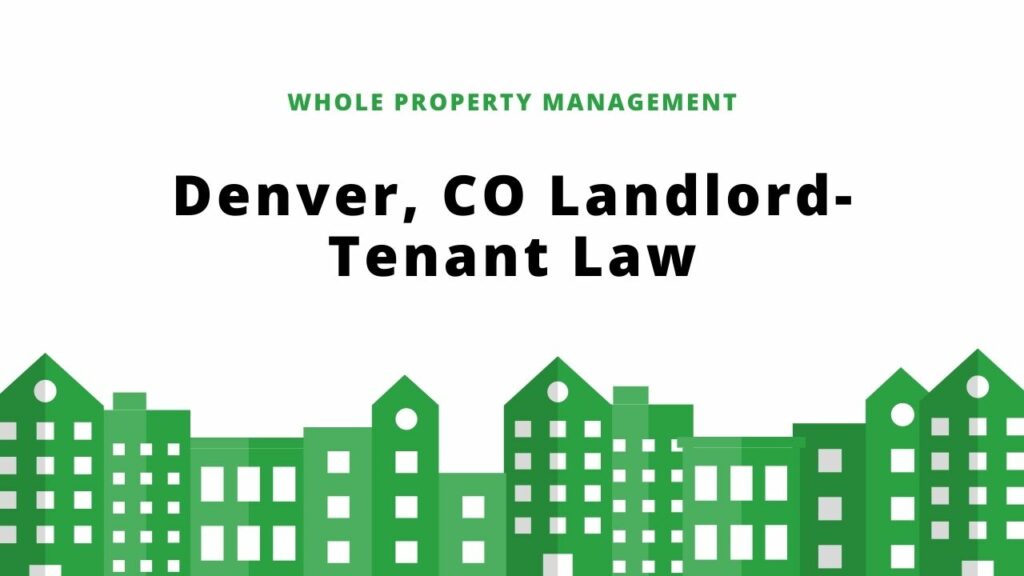Colorado Rental Laws – An Overview of Landlord-Tenant Rights in Denver

In Colorado, lease agreements between landlords and tenants can take two different forms: oral or written. Once the agreement has been established, both parties obtain certain rights and are responsible under Colorado’s Landlord-Tenant Law (C.R.S. Title 38, Art. 12).
Whether you’ve just broken into being a landlord or you are a seasoned real estate investor, you should understand your roles and responsibilities according to Colorado landlord-tenant law. This is why we at Whole PM have put together the following article.
Required Landlord Disclosures in Colorado
As per Colorado laws, landlords must disclose if the rental home was built before 1978. If so, you need to let your renters know to expect lead-based paint on the property. This is a federally mandated disclosure, and the only one Colorado landlords are required to make.

Colorado Tenants Rights & Responsibilities
As per Colorado landlord-tenant law, tenants have the following rights that should be observed under the written rental agreement.
- The right to live in peace and quiet, without unnecessary disruptions from neighbors, or the landlord or any of his agents.
- To have repairs made within a reasonable time after requesting them from the landlord.
- To be respected and treated fairly by the landlord as per the Fair Housing laws.
- To live in a habitable dwelling as per the state’s Warranty of Habitability.
- Be provided all the facilities and amenities promised in the lease.
- To form or join a tenants’ union to exercise their rights without being retaliated against.
- Be provided reasonable notice prior to landlord entry.
- Be notified of any changes made to the agreement and not break the agreement.
Additionally, according to Colorado landlord-tenant laws tenant responsibilities include:
- Ensuring the home is safe and habitable.
- Maintaining an appropriate level of cleanliness as described in the agreement.
- Handle minor repairs and maintenance.
- Take care of all damages they cause on the property.
- Reporting any maintenance to the landlord within an appropriate time frame.
- Maintain the property’s peace and quiet.
- Pay monthly rent on time, every time and not withhold rent without a legally justifiable reason.
- Leave the property in the same state they found it when the lease ends.
Colorado Landlord Rights & Responsibilities
Colorado law also describe the rights and responsibilities of all landlords operating in the state. These rights include:
- To enter their tenant’s unit and carry out required repairs or maintenance tasks.
- To make changes to the terms of the agreement.
- To evict a tenant for violating the terms of the agreement, for example not paying any late fees.
- The right to increase a tenant’s rent by whatever amount and charge late fees if rent is not paid on time, as Colorado doesn’t have a rent control law in place.
- Deny a rental application based on the selection criteria or failure to pay rental application fee expenses. The selection criteria, however, must be discrimination-free.
- Be served notice by a tenant who is looking to move out.
Landlord’s are responsible for the following.
- Provide a dwelling that is habitable and make repairs within a reasonable period.
- Treat all tenants with respect and fairness.
- Follow all the terms of the lease agreement.
- Provide all amenities and facilities promised in the lease agreement.
- Follow Colorado eviction laws when evicting tenants for gross violation of the lease agreement.

An Overview of the Landlord-Tenant Laws in Colorado
Tenant Evictions
The reasons for evicting a resident can range by interest, for example, if the tenant fails to pay rent, fee, excessive property damage, or a violation of policies. So as a landlord, there may come a time when you’ll have to evict a tenant from your rental property.
Regardless of the reason for the lease violation, though, landlords have a duty to follow the state’s laws. It’d be illegal for landlords to try to evict their tenant “constructively” by way of:
- Shutting down their utilities.
- Locking them out of the premises.
- Throwing out or confiscating their belongings.
According to Colorado landlord-tenant laws, a tenant eviction process can only start with a legally justifiable reason such as a failure to make a rent payment. Next, you must terminate the lease by serving them an eviction notice.
If the tenant doesn’t abide by the notice, landlords can move to court and file a summons and complaint. The court will then make the final decision on the case.
Security Deposits
Colorado landlords must also abide by Colorado security deposit laws when working with a tenant security deposits. Some of the rules are as follows:
- Landlords have a one-month time frame to return their tenant’s security deposit fee after they move out.
- A written itemized statement if there are deductions made to the security deposit.
- Allowable reasons for security deposit deductions, such as to cover unpaid rent.
For more information on Colorado’s security deposit laws, feel free to reach out to us at Whole PM. We have years of security deposit management and experience, and would love to be of service.
Early Lease Termination
A tenant in Colorado has a right to break their rental agreements early for certain legally justified reasons. These reasons include:
- Where the lease has an early termination clause.
- If the tenant is starting active military duty.
- If the rental unit is no longer habitable.
- In case of landlord harassment or domestic violence.
- If there is a gas hazard at the rental property.
Other than these reasons, such as domestic violence, tenants who end their lease agreements early, may still be liable for paying rent for the remainder of their term. That notwithstanding, Colorado landlords still have a responsibility to make considerable efforts to re-rent their units.

Rent Increase Laws
Currently, the state of Colorado doesn’t have laws regarding tenants’ rent control in place. So, you can charge whatever amount you want in rental prices aswell as applicable late rent fees. Also, you aren’t required to notify, provide justification, or provide written notice for the increase.
However, it is always best to set a fair rental rate to get the most response from prospects.
Housing Discrimination
The Fair Housing Acts are state and federal laws that prohibit all forms of housing discrimination based on protected characteristics. At the state level, such protections include race, color, disability, nationality, and religion.
Colorado also has some state-specific protections that add to the Fair Housing Act including ancestry, gender identity, marital status, sexual orientation, and ownership of a service animal.
Landlord Entry
Even though the Colorado landlord-tenant laws do not force you to provide notice of entry to your tenant. Colorado landlords still provide their tenant with “reasonable” notice as a good practice but it does not need to be part of the lease or rental agreement.
Changing of Locks
Colorado offers tenant protection as landlords are prohibited from changing locks unilaterally, as that can be a form of constructive eviction.
Tenants, on the other hand, may be allowed to legally change the locks on their own. The only exception here is if it’s disallowed in the lease explicitly.
Bottom Line
Landlords operating in the state of Colorado should understand the landlord-tenant laws. These laws govern your interactions with your tenants and immediately sets certain expectations that need to be fulfilled. Should they not be fulfilled then you may find yourself in Colorado small claims court.
If you have any questions, such as regarding the Fair Housing Act or setting a fair rental value, it’s always good to contact an experienced real estate management company such as ourselves at Whole PM.
Our years of experience in the Colorado rental market put us in the perfect position to help. So contact us today!
Disclaimer: This blog isn’t a substitute for professional legal advice from an attorney. For expert help, please get in touch with a qualified attorney under the Colorado bar association or an experienced real estate management company.
